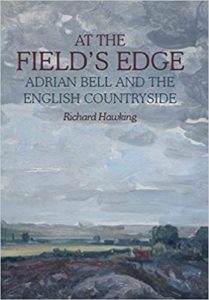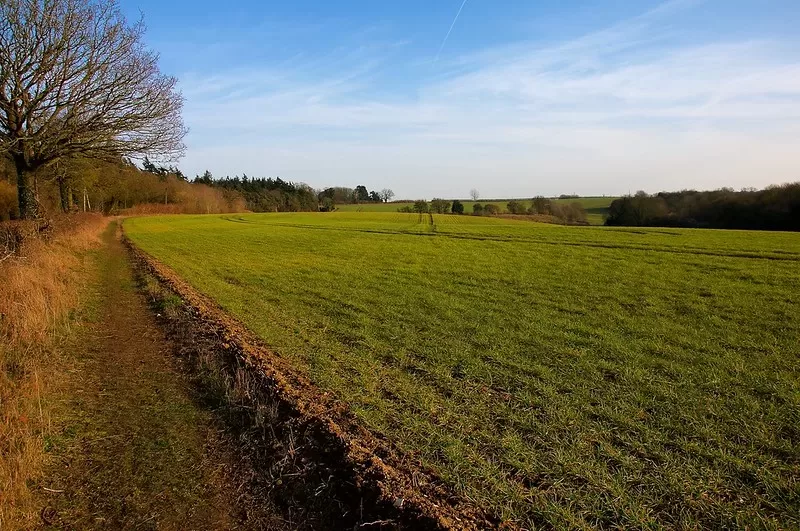One of the first actions the British Government took after their withdrawal from the EU on the 1st January was to vote to allow a pesticide (neonicotinoid thiamethoxam) to be used by farmers on sugar beet: a pesticide that is banned under EU law because it kills bees and other pollinators. The implications for our countryside – a countryside whose diversity has been devastated over the past eighty years due to the rise of industrial agriculture – hardly bears contemplation. Such a disregard for the wellbeing of nature (and of course, in the long-term, for us all) was something that deeply concerned one of Britain’s most important farmer-writers of the twentieth century: Adrian Bell.
Adrian Bell was born in London in 1901. He came from a middle-class family and was destined for a career in the city. However, after leaving the private and privileged Uppingham School (which he hated) he became disillusioned with his options, making the decision to become an apprentice farmer, moving to Suffolk in 1920. Bell wrote his first book, Corduroy, in 1929, and, though there were periods during the next fifty years when he stopped farming, he continued to write about rural life, taking his inspiration from his adopted and beloved Suffolk.
In total, Bell published twenty-five books and contributed many articles to magazines and anthologies. From 1950 to 1980 his Countryman’s Notebook was a weekly feature in the Eastern Daily Press, a Suffolk publication institution. He also set the first Times Crossword in 1930 – which was the first to appear in any publication in Britain – and went on to compile over three thousand in a fifty-year period.
Bell also lived through an agricultural revolution. He struggled to see the long-term wisdom of the changes in agricultural practice in the mid-twentieth century – a time in which the English countryside was controlled and changed more than ever before. As a result, Bell is our eye witness and our recorder of this revolution: he helps to shape our understanding of the scope and impact of the many changes on the soil, the land, the produce, the animals, and, of course, the people.
He fundamentally understood the land and human nature, and predicted the many problems we have created in our unthinking interactions with the countryside. Drawing upon his experiences as a farmer, there is a practical philosophy that runs throughout Bell’s writing. It is a philosophy that – if we pay attention to – can help us to recover a practical and vital vision for our countryside today.
In Corduroy, his first and perhaps most popular book, he talked of self-sufficiency, affinity with nature, and the beauty of England. However, in its opening pages, Bell acknowledges that his first weeks as a farm apprentice proved to be a steep learning curve:
It had been a shock to me, having just left a posh school at the age of eighteen, and gone on a farm, to find myself equated with the village idiot. Here my education counted for nothing, and most of it was nothing. I could have gone to Cambridge and been regarded as a brain, but here I was set to turn a handle. It was a sweating out of former notions.
A little further on, he describes attempting to break up clods of earth with a horse and harrow, only to end up with a mess of tangled metal after allowing the horse to turn too sharply. This lack of knowledge of his new environment was beginning to trouble and embarrass him:
‘I was angry with myself and beginning to feel that I could not touch anything without making an ass of myself. The men’s boots seemed to absorb earth like second nature, incorporating it into their colour and character, but mine looked outraged by it’.
However, as Bell develops the scene – in which he slowly gets to grips with the horse and the harrowing and settles into a satisfying rhythm – he recollects Thomas Hardy’s poem ‘In Time of ‘The Breaking of Nations’’:
Only a man harrowing clods
In a slow silent walk,
With an old horse that stumbles and nods
Half asleep as they stalk.
In these lines, Bell begins to view himself as the traditional figure of rural England often portrayed in literature and art. However, he quickly takes issue with Hardy’s romanticised view of this rural figure: he sees himself as someone working with the land, not working in a landscape. Bell emphasises this separation between a literary representation and something approaching a more genuine experience further in the passage when he writes:
‘I was as busy as I had ever been in my life as I moved across the field with my horse, looking no doubt as drowsy as could be to any nature poet who happened to be passing on the road.’
For Bell, harrowing clods involves focused observation, experience and skill: a close critical engagement not only with ideas, but with the land itself. As a result, he does not wish to offer simply an intellectual engagement with the countryside in his writing: he wanted to live and experience it. He writes:
I am constantly being told ‘You should let other people do the sheer spade-work, the machine-minding, the cow-keeping; while you give yourself to higher things.’ Creative literary work and so forth. They will never understand that nothing good can come out of a man in that way unless it is squeezed; unless there is a pressure almost as physical as that of a hand crushing the juice of an orange. And that pressure is only generated by actual frictional contact with life.
As Bell’s appreciation of the craft and wisdom of farmers grew with his own farming experience in the 1930 and 1940s, Bell could also see that the vision of rural England he depicted in Corduroy – largely based on traditional methods of farming – was changing as the Second World War was coming to an end. He writes in a later publication (Apple Acre, 1946) ‘it was clear that the old ways had gone for good. Now a new order must emerge from the rubble of tradition. There would be no going back. Artificial insemination, mechanised labour and open-plan farmsteads were changing the face of the countryside and the fate of the countryman.’ Therefore, however much farmers were being appreciated and supported financially during the war, Bell became increasingly concerned about the direction that farming was taking and the impact this would have on the countryside and its population.
He knew that we could not simply treat the environment like a factory that will keep producing for us. To Bell, farming is not like any other job or business: it is husbandry. Its primary concern has always been about producing food to provide for women, men and children, with the secondary concern being the welfare of the land and the animals. Throughout Bell’s work, particularly in his later writing, he could see that a move away from small mixed farming to industrial farming would prove to be detrimental not only to the English countryside but, in the long term, to us all. He argued passionately in his long writing life that if we are to understand the land, produce real food, live authentic lives, and save rural communities then we must understand and experience the worth of the farming life that works with nature, not against it.
Thus, Bell’s respect for this fundamental element of the natural world lies at the heart of all of his writing, from the opening pages of Corduroy to his final Eastern Daily Press article. Throughout his work, he argues that we need to farm not only for the benefit of both urban and rural communities, but also for the long-term benefit of the land itself. Bell believed that farmers have a duty to the land they work; a duty that should be as highly regarded by society as any other. Rather than being reduced to people that run a ‘factory with the roof off’ farmers should instead be flag-bearers who remind us all the environment needed to produce it.
Therefore, his desire for a return to more traditional farming methods – a more sympathetic husbandry – that is expressed throughout his wonderful writing is not born out of any sense of nostalgia. It is a desire to create a society that values those that produce as well as those that consume. It is a desire that people develop a connection with the land they live on, and what is done on it. It is a desire to re-establish a sense of place and a sense of harmony with our environment, and a shared purpose with each other. As we embark on a new year and an uncertain future, Bell’s beautifully-crafted prescient observations echo down through the years.
Richard Hawking is the author of At The Field’s Edge: Adrian Bell and the English Countryside (2019), published by  Robert Hale Ltd and available here.
Robert Hale Ltd and available here.
Learn more about Richard on the Contributors page.
Looking for a book? Support independent publishing! Check out the largest list of independent publishers (with descriptions).
(Photo: Suffolk Fields, by Martin Pettitt/ flickr.com/ CC BY 2.0)
- Adrian Bell and the Wisdom of the Fields, by Richard Hawking - February 4, 2021

